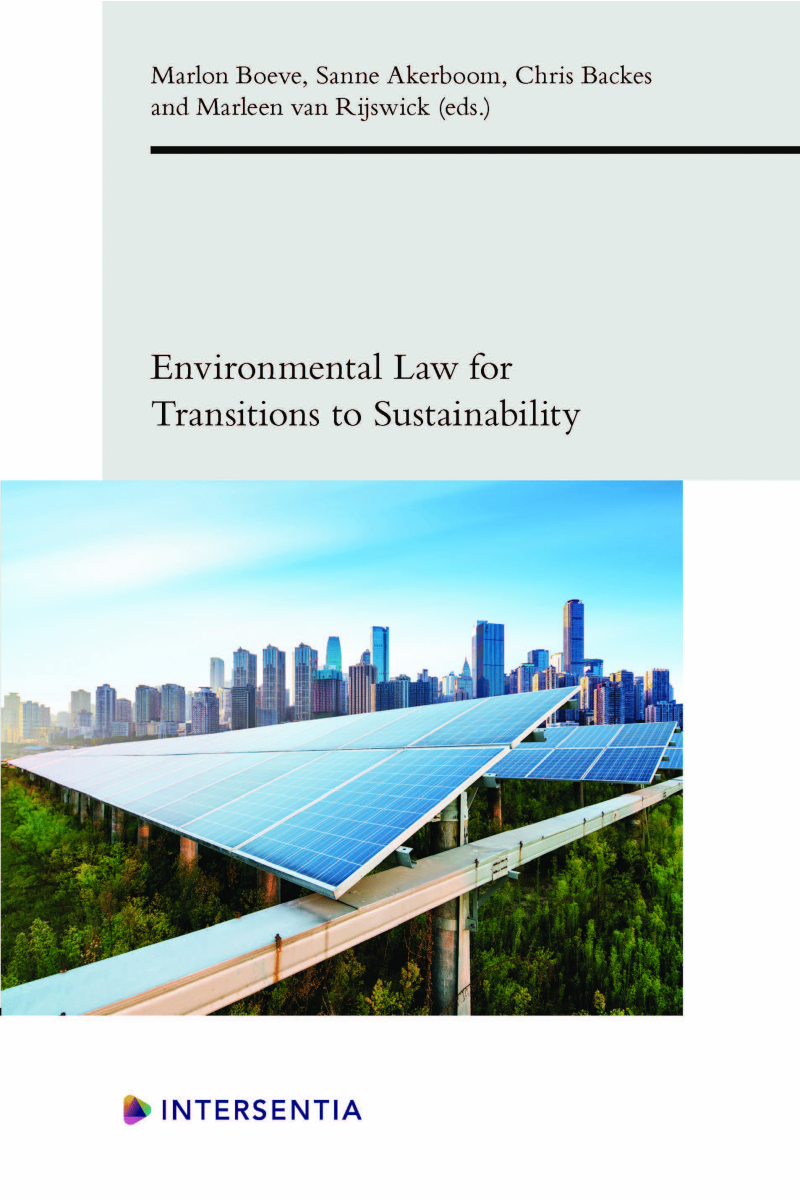 maestro
mastercard
visa
maestro
mastercard
visa

Environmental Law for Transitions to Sustainability

Over the last decades, environmental law has significantly contributed to limiting pollution and decoupling economic growth and negative environmental effects. However, current challenges require out-of-the-box solutions, integrated and inclusive approaches of both public and private actors and cross-border sets of instruments. This book presents inspiring ideas about how law can support the fundamental transition processes to a sustainable future and how it can provide guidance on the pathways to sustainability.
This book focuses on issues such as what legal instruments optimally encourage disruptive breakthroughs and where law may actually hamper sustainable innovations and solutions. It examines conceptual issues and specific legal tools, not only from an EU law perspective, but also from national and international law perspectives. Alongside general discussions about the role that law plays in encouraging sustainability, the book also concentrates on substantive areas in which transition processes to sustainability are urgently needed: the transition to a low carbon economy in order to comply with the Paris Agreement for climate change, the transition to a holistic management of water resources to achieve water security and the transition to halting the loss of biodiversity.
The different contributions make clear that until recently, law played a limited role and should be further developed and improved to better align with the more general aim to move towards a sustainable society. This book can serve as an inspiration for further discussion on the role of law as a tool for supporting the transition to a sustainable future.
_____
MARLON BOEVE is Assistant Professor at the Utrecht Centre for Water, Oceans and Sustainability Law, Utrecht University, the Netherlands. Her research focuses on European and national environmental law and spatial planning law. She is particularly interested in how law can support the transition to a circular economy. She is coordinator of the interdisciplinary platform 'Towards a Circular Economy and Society' at Utrecht University and is a member of the editorial board of the Dutch Journal for Environmental Law.
SANNE AKERBOOM is Assistant Professor of Law and Politics of the Energy Transition at the Copernicus Institute of Sustainable Development (Faculty of Geosciences), Utrecht University, the Netherlands. Her work examines the energy transition from a legal, political and social sciences perspective. She publishes in legal, governance and energy and climate journals, both in English and Dutch. She is coordinator of the Utrecht University and TUEindhoven collaboration on the 'Fair Energy Transition' as well the hub on 'Decarbonising the Energy System' at Utrecht University.
CHRIS BACKES is Professor of Environmental and Planning Law at the Utrecht Centre for Water, Oceans and Sustainability Law, Utrecht University, the Netherlands. Notably, he has acted as President of the Dutch Society for Environmental Law, a member of the Netherlands Council for Nature Protection (Natuurbeschermingsraad) and a member of the Netherlands Council of Housing, Spatial Planning and the Environment (VROM-Raad). He specialises in sustainability law as well as environmental and planning law with a special focus on law for circular economy and biodiversity law.
MARLEEN VAN RIJSWICK is Professor of European and Dutch Water Law and is Director of the Utrecht Centre for Water, Oceans and Sustainability Law, Utrecht University, the Netherlands. Her research focuses on the question of how law can contribute to a sustainable and equitable use of water resources based on shared responsibilities. Notably, she has acted as President of the Dutch Society for Environmental Law, a member of the Netherlands Council for Water legislation (Commissie van Advies voor de waterstaatswetgeving) and a member of the Wadden Sea Council (Waddenraad). Her research interests include water law and adaptation to climate change within the broader field of environmental law, spatial planning law, nature conservation law and European and constitutional and administrative law.
| Type of product | Book |
|---|---|
| Format | Paperback |
| EAN / ISSN | 9781780689296 / 9781780689302 |
| Series name | European Environmental Law Forum |
| Weight | 800 g |
| Status | Available |
| Number of pages | xviii |
| Access to exercice | No |
| Publisher | Intersentia |
| Language | English |
| Publication Date | Apr 6, 2021 |
| Available on Strada Belgique | No |
| Available on Strada Europe | No |
| Available on Strada Luxembourg | No |
Downloads
- PART I. TOOLS IN GENERAL
- Preconditions and Constraints of Effective Private Environmental Governance
- PART II. TOOLS FOR COMPLIANCE WITH THE PARIS AGREEMENT
- Towards a Cumulative Effect in Combating Climate Change with Special Focus on Disaster Risk Reduction: Paris Agreement, SDGs and the Sendai Framework
- PART III. TOOLS FOR HALTING THE LOSS OF BIODIVERSITY
- Overabundant Ungulates Causing Biodiversity Loss and Human-Wildlife Conflicts: The Role of the National Law and Governance Structure in the Italian Jurisprudence
- PART IV. TOOLS FOR ACHIEVING WATER SECURITY
- Reporting Mechanism under the Water Convention: Innovation in the Sustainable Management of Transboundary Water Resources?